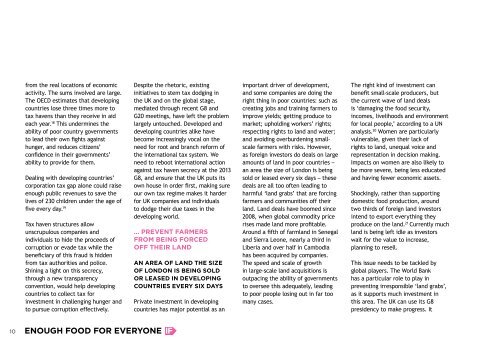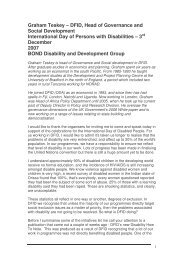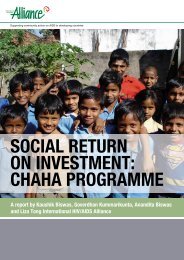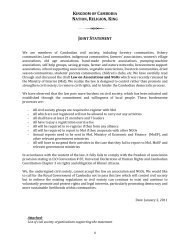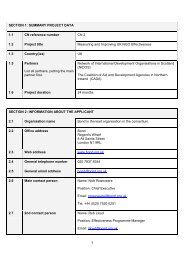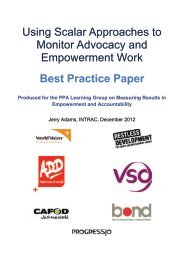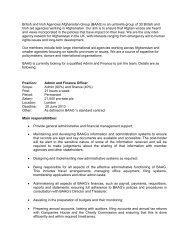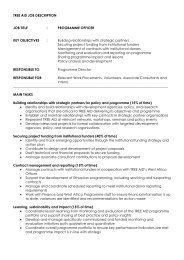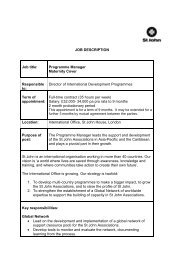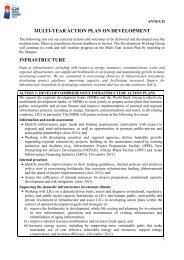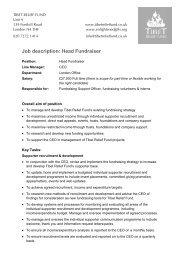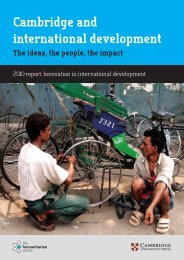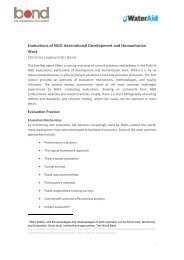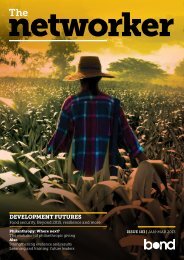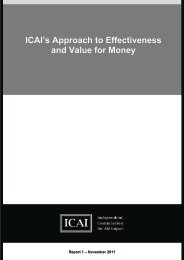THE NEED FOR UK ACTION ON GLOBAL HUNGER - Enough Food IF
THE NEED FOR UK ACTION ON GLOBAL HUNGER - Enough Food IF
THE NEED FOR UK ACTION ON GLOBAL HUNGER - Enough Food IF
Create successful ePaper yourself
Turn your PDF publications into a flip-book with our unique Google optimized e-Paper software.
from the real locations of economicactivity. The sums involved are large.The oecd estimates that developingcountries lose three times more totax havens than they receive in aideach year. 18 This undermines theability of poor country governmentsto lead their own fights againsthunger, and reduces citizens’confidence in their governments’ability to provide for them.dealing with developing countries’corporation tax gap alone could raiseenough public revenues to save thelives of 230 children under the age offive every day. 19Tax haven structures allowunscrupulous companies andindividuals to hide the proceeds ofcorruption or evade tax while thebeneficiary of this fraud is hiddenfrom tax authorities and police.shining a light on this secrecy,through a new transparencyconvention, would help developingcountries to collect tax forinvestment in challenging hunger andto pursue corruption effectively.despite the rhetoric, existinginitiatives to stem tax dodging inthe uK and on the global stage,mediated through recent g8 andg20 meetings, have left the problemlargely untouched. developed anddeveloping countries alike havebecome increasingly vocal on theneed for root and branch reform ofthe international tax system. weneed to reboot international actionagainst tax haven secrecy at the 2013g8, and ensure that the uK puts itsown house in order first, making sureour own tax regime makes it harderfor uK companies and individualsto dodge their due taxes in thedeveloping world.… prevent farmerSfrom being forceDoff their LanDan area of LanD the Sizeof LonDon iS being SoLDor LeaSeD in DeveLopingcountrieS every Six DaySprivate investment in developingcountries has major potential as animportant driver of development,and some companies are doing theright thing in poor countries: such ascreating jobs and training farmers toimprove yields; getting produce tomarket; upholding workers’ rights;respecting rights to land and water;and avoiding overburdening smallscalefarmers with risks. however,as foreign investors do deals on largeamounts of land in poor countries –an area the size of london is beingsold or leased every six days – thesedeals are all too often leading toharmful ‘land grabs’ that are forcingfarmers and communities off theirland. land deals have boomed since2008, when global commodity pricerises made land more profitable.Around a fifth of farmland in Senegaland sierra leone, nearly a third inliberia and over half in cambodiahas been acquired by companies.The speed and scale of growthin large-scale land acquisitions isoutpacing the ability of governmentsto oversee this adequately, leadingto poor people losing out in far toomany cases.The right kind of investment canbenefit small-scale producers, butthe current wave of land dealsis ‘damaging the food security,incomes, livelihoods and environmentfor local people,’ according to a unanalysis. 20 women are particularlyvulnerable, given their lack ofrights to land, unequal voice andrepresentation in decision making.Impacts on women are also likely tobe more severe, being less educatedand having fewer economic assets.shockingly, rather than supportingdomestic food production, aroundtwo thirds of foreign land investorsintend to export everything theyproduce on the land. 21 currently muchland is being left idle as investorswait for the value to increase,planning to resell.This issue needs to be tackled byglobal players. The world bankhas a particular role to play inpreventing irresponsible ‘land grabs’,as it supports much investment inthis area. The uK can use its g8presidency to make progress. It10


